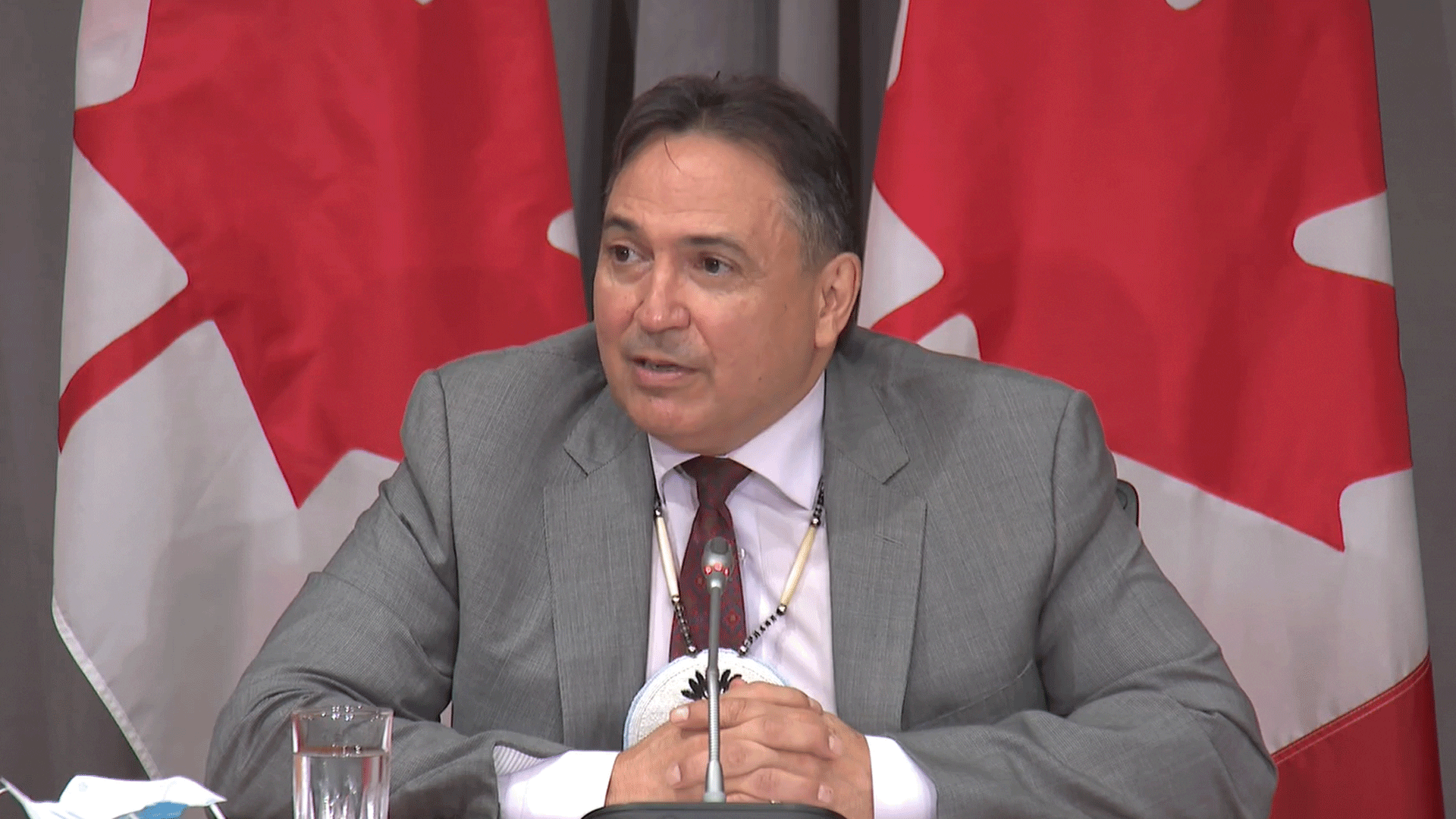The respective heads of the Assembly of First Nations and Indigenous Services Canada smiled amid light-hearted concern over hand sanitizer as they passed pen and paper back and forth on Tuesday in Ottawa, signing an agreement that aims to push First Nation child welfare reform legislation Bill C-92 forward.
“All joking aside, this is an historic moment and I’m really honoured to have been a small part of it,” said Pam Damoff, parliamentary secretary to ISC Minister Marc Miller.
“We’ve always talked about a distinctions-based approach for implementation of Bill C-92, and that’s really what this MOU is about,” AFN National Chief Perry Bellegarde added.
“It’s about improving the quality of life for our children.”
The protocol agreement’s key takeaways include establishment of a joint table to discuss funding, establishment of a joint national working group, commitment to regular bilateral meetings, and creating tools at the federal level to implement the bill designed to reduce the number of First Nation kids in care.
While the government touted the landmark and historic nature of the bill and the agreement, numerous questions remain unanswered.
Tabled in February 2019, Bill C-92: An Act respecting First Nations, Inuit and Métis children, youth and families passed in June and became law Jan. 1, 2020.
It introduces new national standards for child and family services, and allows First Nations to assert inherent jurisdiction over the provision of those services by entering into negotiations with ISC.
But throughout the process the legislation was dogged by concerns over funding, implementation, oversight and a constitutional challenge to the bill launched by Quebec.
Read more:
Federal Indigenous child welfare Bill C-92 kicks in – now what?
Trudeau government has no plan in place to implement new child welfare act: lawyers
Bellegarde admitted some provinces are more receptive than others, using Quebec’s challenge as an example.
“There’s too many children in foster care under provincial systems and we’ve said it this way – that you’ve got to focus on the children, keep them at home in their communities and their families,” said Bellegarde. “The existing system is not working.”
He said reducing the more than 40,000 First Nation kids in custody will require a shift from apprehension to a model that focuses on prevention and keeps children in communities connected with family and culture.
Miller said that despite Quebec’s outstanding challenge, C-92’s national standards remain law for all.
“I don’t dictate the terms on which provinces take the federal government to court on constitutional basis,” he said. “This is their right, but we will defend it vigorously, and indeed Indigenous communities who are affirming their inherent right will, I assume, do so as well.”
Reporters pressed Miller on the question of money – how much of it is coming to support C-92 and when?
He called the agreement a “road map” for having discussions about funding but refused to set a number or deadline despite being asked repeatedly.
“We have made budgetary requests. The prime minister has committed to amounts sufficient to allow communities to transition, to affirm the authority over the children that have been taken into care,” Miller said.

Bellegarde added, “It’s needs-based. Once needs have been identified, clearly the necessary resources to meet the needs have to flow, and then it’s our job to push the Crown that that happens.”
APTN News asked if the looming economic deficit spurred by the COVID-19 public health crisis will impact the flow of funds.
In response, Miller said the cost of inaction will be higher than that of investing in children’s health and wellbeing.
“What is the cost of doing nothing? We’ve seen what the cost of inaction is,” he said. “We’ve tried the other model and it costs money, and it would, if you look at it from a numbers perspective, the courts are telling us what to do and we’ve been spending time as a federal government catching up to court cases and so we want to get ahead of this.”
One of those court cases pegs the cost of inaction at exactly $40,000 – the figure the Canadian Human Rights Tribunal ordered the federal government to pay each First Nation child and family that have been unnecessarily removed from their homes and placed into state care.
The tribunal found in 2016 that the federal government’s willful and reckless underfunding of the First Nation child welfare system on reserves and in the Yukon constituted state-sponsored racial discrimination. In 2019, the tribunal awarded $40,000, the maximum allowable amount under the Human Rights Act, in damages to kids harmed as a result.
The Crown has requested a judicial review that aims to quash the order.
Canada’s independent spending watchdog, Parliamentary Budget Officer Yves Giroux, estimated that it would total between $900 million to $2.9 billion to comply with it.
Another court case comes from the man who sat to Miller’s left and signed the agreement – Bellegarde.
The AFN filed a proposed class-action suit in January 2020 that argues the Crown systemically discriminates against First Nation kids because of their race.
A similar proposed class-action was filed in spring 2019 and names Xavier Moushoom and Jeremy Meawasige as plaintiffs.
The government has expressed willingness to compensate First Nations kids, but how that might come about remains unclear.
Some First Nations groups have said they are ready to take over provisions of child welfare services, but Miller refused to comment on the status of these talks.
-With files from Todd Lamirande










